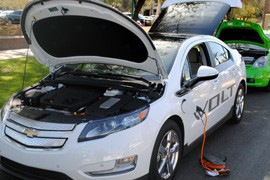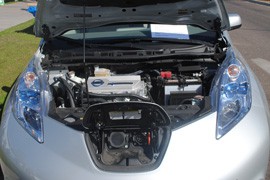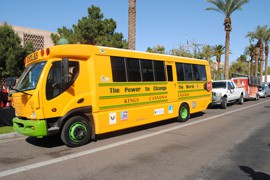Cronkite News has moved to a new home at cronkitenews.azpbs.org. Use this site to search archives from 2011 to May 2015. You can search the new site for current stories.
Alternative fuel vehicles parked at Capitol to garner legislative support
PHOENIX – A cherry picker and a cab. A Tesla and an 18–wheeler. A frozen food truck and a school bus.
Parked in front of the State Capitol, these vehicles had more in common than wheels.
Arizona’s Clean Cities coalitions brought in two dozen cars and trucks Tuesday to show legislators the kinds of vehicles that have been and can be powered by alternative fuels.
“A lot of them have no idea what alternative fuel can do,” said Colleen Crowninshield, manager of Tucson Regional Clean Cities Coalition. “Today, we’re letting them actually see the vehicles, touch them, sit in them.”
More than 20 local and national companies supporting alternative fuels lined a sidewalk with posters and booths.
In order for alternative fuels to become more than just novelties, the advocates said, there must be legislative support and infrastructure.
“There are definitely a lot of political hurdles,” said Richard Lemon, a coordinator at Arizona State University’s Global Institute of Sustainability.
Alternative fuels and renewable energy are typically Democrat–supported initiatives, Lemon said, making them a tough sell in Arizona’s Republican–dominated Legislature.
“People let party lines guide them. They don’t accept the science,” he said. “There has to be more education. That’s why we’re here.”
But Crowninshield said she believes all lawmakers see the value in alternative fuels.
“They all want to do something, and a majority of them are behind us,” she said. “They all have children and grandchildren and they know this is the future.”
Republican Secretary of State Ken Bennett, the former CEO of a fuel–distribution company, appeared at the event to show his support for Clean Cities.
“You might be thinking, ‘Why would someone who’s made their living dispensing diesel and gasoline be here?’” he said.
Bennett said it’s because he believes alternative fuels can spur economic growth in Arizona, attracting new companies and weaning the state off its dependence on foreign oil.
On behalf of Clean Cities, Bennett gave awards to such companies as General Electric and Frito–Lay and the Mesa, Vail and Deer Valley school districts – institutions that have replaced their fleets fully or partially with alternative fuel vehicles.
Mesa Public Schools is a customer of Roush CleanTech, a company that has invested $25 million in research and development for propane–fueled vehicles.
“The lack of understanding about alternative fuel amazes me,” said Todd Mouw, vice president of sales and marketing for Roush. “But here, lawmakers can see it in action instead of the pipe dream they think it is.”
Advocates said part of that pipe–dream mentality in Arizona has to do with the lack of infrastructure, particularly the scarcity of charging stations for electric cars.
People won’t buy electric cars without those stations widely available, but the stations won’t start springing up until more people buy electric cars, said Sean Hegna of Eaton, a company that manufactures residential and commercial electric vehicle chargers.
“It’s kind of a chicken–or–egg situation,” he said. “Which has to come first?”
At the event, Hegna displayed a home charger, sold for $1,000. Installation costs are, on average, about $2,000.
Still, every major car manufacturer is developing electric and alternative fuel cars, Hegna said, including Nissan, Toyota, Honda and Chevrolet.
Bill Sheaffer, executive director of Valley of the Sun Clean Cities Coalition, said that after a slow period due to the economic downturn, the alternative fuel movement is back, with the potential to replace imported oil and improve air quality.
“Clean American fuels are back in the race,” Sheaffer said. “For some people, they’ll never have to go to a gas station again.”









